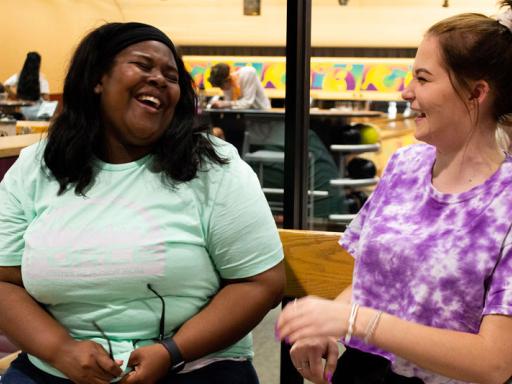This content was excerpted from an article originally published by Grantmakers in Health.
In an article originally published by Grantmakers in Health, CMF members Andrea Cole, executive director and CEO of the Ethel and James Flinn Foundation and Becky Cienki, director of behavioral health at the Michigan Health Endowment Fund, share more about the TRAILS program which provides mental health resources to schools statewide.
American youth are facing a mental health crisis of unprecedented proportions. Even before the pandemic, nearly 50% of adolescents in the United States experienced symptoms of a mental illness. Of that number, a mere 20% received treatment.
Today, as COVID-19 continues to exacerbate deep-seeded inequities, the need for youth mental health services is growing, alongside a parallel increase in barriers to care. According to a report published by the Centers for Disease Control and Prevention, 25% of young adults considered suicide in June 2020, while rates of mental health-related pediatric emergency room visits increased by 25%. In the state of Michigan, where our foundations—the Ethel and James Flinn Foundation and the Michigan Health Endowment Fund—operate, public health experts anticipate that COVID-19-related increases in poverty, family stress, substance abuse, domestic violence, and child abuse will have catastrophic consequences, with children and teens of color at exceptional risk.
As funders, we recognize that expansive challenges often require expansive solutions—and that building sustainable mental health support requires broad community buy-in. Our work with the University of Michigan organization TRAILS (Transforming Research into Action to Improve the Lives of Students) exemplifies this effort: by embedding mental health services directly into schools, TRAILS works to ensure that all students have access to the care they need. Over the past four years, TRAILS has trained nearly 10,000 educators and school support staff, such as school counselors and social workers, to provide evidence-based mental health programming to an estimated 90,000 students.
Now, thanks to the combination of an estimated $22 million in public-private funding from a historic state education bill and collaborative philanthropy support, TRAILS has begun to expand its programming statewide.
Scaling the TRAILS Model
TRAILS first piloted its school-based programs in 2013, training Ann Arbor school counselors in cognitive behavioral therapy (CBT) and mindfulness techniques and providing continuous support through consultation and online resources. Funding from our foundations helped support infrastructure to expand and sustain the model, with 150 Michigan community-based mental health providers joining its coaching workforce by 2016. As the demand for TRAILS support continued to grow, the state of Michigan and other Michigan foundations jumped on board, and expansion statewide and beyond was all but inevitable.
Throughout the model’s rapid expansion, its impact has been unmistakable. In evaluations, students have shown clear improvements in adaptive coping skills and reduced symptoms of depression and anxiety. School staff are demonstrating increased knowledge and utilization of CBT and mindfulness. Many report that TRAILS is the most impactful school mental health program available and that its resources are unequaled.
Within the next three years, TRAILS aims to bring training, resources, and implementation support to all 56 intermediate school districts in the state of Michigan, spanning 560 schools and serving over 336,000 students. In order to onboard these new partners, TRAILS will expand its clinical and project management teams and bolster key technologies and data systems. These advancements will help all partner schools provide precision mental health care with documented, quantifiable outcomes across three tiers of service:
• Tier 1 – Programs that foster a positive school climate and build social, emotional, and behavioral skills for all members of the school community.
• Tier 2 – Programs that provide early intervention for students experiencing mild to moderate symptoms of depression, anxiety, and post-traumatic stress.
• Tier 3 – Programs that provide identification and management protocol for students at risk of suicide, including links to external mental health care providers.
This scaling process has already begun, with the aim of reaching 15 additional districts during the 2021-2022 academic year.
Looking to the Future
The TRAILS expansion in Michigan can serve as a model and learning experience for mental health organizations nationwide. A public-private collaboration of this magnitude—which will leverage federal, state, and philanthropic dollars to bring evidence-based mental health programming to every school district in Michigan—breaks new ground in school-based mental health services and provides actionable steps toward what must be a central component of pandemic recovery: a focus on the well-being of children and teens.
Furthermore, the TRAILS system is designed to last. After an initial training that equips educators and school mental health professionals to effectively use evidence-based practices and pedagogy, schools transition to providing TRAILS programming independently. This affordable, effective, and sustainable model maximizes each school’s capacity to meet the mental health needs of its students, especially in the long term.
Michigan’s collaborative investment in this work is a commitment to our children, as they reel from a health crisis that continues to cause untold levels of trauma. It is also a commitment to our schools, which have the power to provide equitable, tailored mental health support to those children, if supplied with the proper training and resources. And it is a message to the rest of the nation: that strengthening school-delivered social and emotional learning and mental health programming is a powerful way to expand access to care.
Elegant in its simplicity and profound in its impact, the TRAILS model is a compelling case study of responsive but durable school-based mental health support.
TRAILS is supported by several CMF members including: Ethel and James Flinn Foundation, Michigan Health Endowment Fund, The Children’s Foundation, The Jewish Fund, Community Foundation for Southeast Michigan, Blue Cross Blue Shield of Michigan Foundation and Metro Health Foundation.
